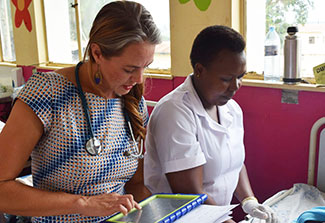Profile: Fogarty Fellow Dr Lisa Bebell studies women living with HIV in Uganda and South Africa
November / December 2019 | Volume 18, Number 6

Photo by Sarah Graham
Dr. Lisa Bebell works with research nurse Honest Twinomujuni
to record data on postpartum sepsis in Mbarara, Uganda.
By January W. Payne
Cultivating long-term partnerships and developing the ability to listen were key to the success of Dr. Lisa Bebell’s two Fogarty fellowships in sub-Saharan Africa (SSA). “One of the things I learned is to take the first cues from the people living in the environment and really try to understand from them what the research priorities are,” she said. The enduring value of these early-career experiences has been research collaborations that continue today.
Fogarty’s
Global Health Program for Fellows and Scholars provides doctoral and postdoctoral students with a year-long mentored research experience in a low- or middle-income country.
In 2005, Bebell traveled to the
Centre for the AIDS Programme of Research in South Africa (CAPRISA) for her first fellowship, to study mucosal immunity among women living with HIV. “We were most interested in understanding what mucosal markers during acute HIV infection would be able to tell us about how the disease would affect a woman over the span of her infection,” Bebell explained. The findings from that work helped establish predictive models to determine how women with HIV would fare over time, and how best to allocate limited resources for assessment and treatment.
For her second fellowship in 2014, Bebell conducted research at
Mbarara University of Science and Technology in western Uganda, studying the postpartum risk for women with HIV to develop other infections after delivering their babies in a semi-rural hospital. The findings she published in conjunction with her partners showed there were fewer infections than expected but those that did exist - mainly urinary tract infections - were highly resistant to antibiotics.
Through this research, a substantial amount of data was collected from 1,500 study participants, providing a rich trove of information for other investigators.
Spending a total of six years overseas has changed Bebell’s perspective and helped her grow both personally and professionally, she said. “Living and working in other settings really challenged me to understand my own place in the world and to understand how it is that we can all work together to make the world a healthier place.”
The research projects she started during her fellowships laid the groundwork for her to successfully compete for a
five-year research career development grant from NIH’s National Institute of Allergy and Infectious Diseases (NIAID). That award is allowing her to test her hypothesis that placental inflammation may contribute to poor health outcomes for children who were HIV exposed but uninfected (HEU). More than one million HEU children are born annually in SSA, and fare worse than those who were not exposed.
Working side-by-side with peers and supervisors at overseas sites has given Bebell new insights into the concept of teamwork, she said. “It really changed my thinking in terms of what value I have to add, what my own limitations are, and how to help pair myself with people who have different strengths and different limitations to work effectively.”
Now with dual appointments at Harvard Medical School and Massachusetts General Hospital, she’s passing on what she learned during her Fogarty fellowships as she mentors the next generation of global health leaders.
“We are each just one cog in a really large machine and it’s only by working together that we can actually achieve success,” she observed. “I’ve learned that working alone is never very beneficial and it’s only by collaborating with partners who understand the local setting that we’ve been able to do anything that really matters - to generate good research that changes people’s lives.”
More Information
- Research project:
HIV Infection, Placental Inflammation, and Early Childhood Outcomes in HIV-Exposed, Uninfected Infants in Uganda supported by NIAID/NIH
-
Centre for the AIDS Programme of Research in South Africa (CAPRISA)
-
Mbarara University of Science and Technology (MUST)
- Related publications:
-
HIV Infection and risk of postpartum infection, complications and mortality in rural Uganda
AIDS Care via PubMed, August 2018 -
Incidence of postpartum infection, outcomes and associated risk factors at Mbarara regional referral hospital in Uganda
BMC Pregnancy and Childbirth via PubMed, June 28, 2018 -
Antimicrobial-resistant infections among postpartum women at a Ugandan referral hospital
PLoS ONE via PubMed, April 13, 2017 -
Genital tract inflammation during early HIV-1 infection predicts higher plasma viral load set point in women
The Journal of Infectious Diseases via PubMed, January 15, 2012 -
Plasma cytokine levels during acute HIV-1 infection predict HIV disease progression
AIDS via PubMed, March 27, 2010 -
Relationship between levels of inflammatory cytokines in the genital tract and CD4+ cell counts in women with Acute HIV-1 Infection
The Journal of Infectious Diseases via PubMed, September 1, 2008
To view Adobe PDF files,
download current, free accessible plug-ins from Adobe's website.